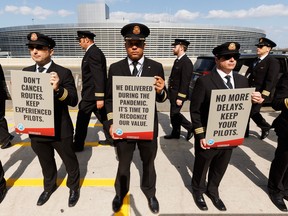Walk-off by 5,400 pilots could happen as early as Sept. 17, after union members deliver overwhelming strike vote at end of 10-year contract

Article content
Pilots at Air Canada, Canada’s largest airline, could walk off the job as early as Sept. 17, after 98 per cent voted in favour of giving their union a strike mandate. Here’s what that would mean for travellers.
What do the pilots want?
Charlene Hudy, head of the Air Canada contingent of the Air Line Pilots Association (ALPA), told the Canadian Press that wages are a major issue for the membership.
Advertisement 2
Article content
Last year, WestJet, the country’s second largest airline, agreed to a contract that included a 24 per cent compensation bump over four years.
Over the last year and a half, new contracts have been signed between the four biggest U.S. airlines and their pilots, meaning some of those workers now make roughly double what Air Canada pilots are earning.
“We all fly passengers under the Star Alliance,” Hudy said. “So we’re flying the same passengers in the same airspace on some of the very same routes, and those pilots are being compensated dramatically more than us.”
When was the last collective agreement signed?
The current collective agreement dates back to 2014, and expired last September.
ALPA, which represents more than 5,400 Air Canada pilots, has been negotiating with the airline with the help of a federal conciliator since June 2023, the Canadian Press reports. Those talks are scheduled to end Monday, with a three-week cooling-off period meaning a strike could begin on Sept. 17 at the earliest.
“It’s a stale, outdated contract,” Hudy said of the previous agreement, per Canadian Press. She added: “There are elements of our collective agreement right now that stem back to just post-bankruptcy,” referring to when the airline filed for bankruptcy protection in 2003.
Article content
Advertisement 3
Article content
What is Air Canada saying?
Arielle Meloul-Wechsler, Air Canada’s chief human resources officer, said in a video message last week that the two sides had reached agreement on “numerous provisions” of the collective agreement.
She noted that despite a decade of labour stability at the airline, “a 10-year-deal creates a bit of pent-up demand. So it’s time to refresh that agreement.”
Air Canada CEO Michael Rousseau told analysts this month that both sides were in agreement on several points, and that he hoped to reach a deal in the coming weeks, the Canadian Press reported.
In an email to Bloomberg news, Air Canada downplayed the strike vote, saying: “Such a vote is a normal step in a negotiation process and does not mean that any disruption will take place.”
What happens if the strike goes ahead?
Air Canada’s pilots would have to give 72 hours notice before beginning a strike action. According to ALPA, a strike would ground roughly 1,000 flights and day, and impact more than 120,000 each day.
Passengers could seek alternate airlines or other modes of transportation, but the effect of so many cancelled flights would make that difficult.
Advertisement 4
Article content
Could the federal government intervene?
In the recent labour relations standoff between railway companies Canadian National and Canadian Pacific Kansas City and their unions, the government has forced a binding arbitration on the two parties that saw rail service resume on Monday.
A similar tactic could be used in this case, although it should be noted that the rail unions are fighting the move even as they return to work. Also, when the federal government tried to prevent a strike by mechanics at WestJet in June, the strike continued, with both sides reaching their own agreement several days later.
How much does an Air Canada pilot make?
A recent job ad at Air Canada says that a captain of a narrow-body (single aisle) aircraft can make $215,000 to $290,000 a year, while a wide-body captain can earn $315,000 to $350,000 pus overtime and expenses. “The airline also offers comprehensive benefits, including a pension plan and an Annual Incentive Plan,” the ad notes.
Epic Flight Academy says a first officer (co-pilot) can expect to earn $56 an hour, or about $107,000 annually.
Advertisement 5
Article content
How worried should we be about a strike?
Duncan Dee, a former chief operating officer at Air Canada, told Global News that he’s hopeful a strike can be averted, noting that two recent potential strike actions by WestJet pilots came to an agreement, “albeit at the very last possible minute.”
He also pointed out that the last time Canada saw an airline pilots’ strike was in the late 1990s. “At the end of the day I think we should remain somewhat optimistic that they can come to an agreement.”
Union pilots plan demonstrations at airports in Toronto, Montreal, Vancouver and Winnipeg on Tuesday.
Recommended from Editorial
Our website is the place for the latest breaking news, exclusive scoops, longreads and provocative commentary. Please bookmark nationalpost.com and sign up for our newsletters here.
Article content






